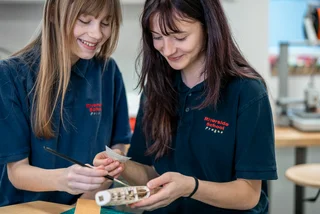Written by Dr. Jaroslava Lankova, GP
for IWAP’s The Bridge Magazine
PARTNER ARTICLE
Influenza (flu) is a contagious disease that is caused by the influenza virus and cannot be cured by antibiotics
1. How do you know you have the flu?
Your illness might be the flu if you have a sudden onset of body aches (such as muscle aches, headache), chills, fever, fatigue, and respiratory symptoms (such as dry cough, nasal congestion, sore throat) and your illness occurs during November through April (which is the usual flu season in the Northern Hemisphere). However, during this time, other respiratory illnesses can cause similar symptoms. It is impossible to tell for sure that you have the flu based on symptoms alone, but treatment is the same for the flu and colds. The severity and length of illness depends on the strength of one´s immunity system. The typical course of the flu means several days of high fever, up to 40 C (104 F), general malaise, and extreme tiredness. You may feel badly for up to a week, and it can take several weeks before you feel completely better.
2. What you can do?
Most people who get the flu do not need to see a doctor as the illness is self-limited and lasts 1 to 2 weeks. In order to alleviate the symptoms and shorten the course you should:
oGet plenty of rest. Sleep is one of the most powerful immune system stimulants. Your body needs its energy reserves for a strong immune function. Stay home from work or school. You will not be productive there, you’ll prolong your illness, and you’ll unnecessarily expose others. It is important to allow your body to recover before returning to normal activities and habits.
oDrink lots of fluids. Most people are chronically dehydrated and water is essential to proper immune system function. Drink water, fruit juices, vegetable juices, herb tea. You might also consider making some hot lemonade from fresh lemons, or hot grapefruit juice sweetened with honey. Avoid soft drinks, alcohol, coffee and caffeine. Try to drink continuously throughout the day. You should drink about 3 liters daily, but the necessary amount depends on how much fluids you are losing through sweating and breathing. The best control of fluid intake is your urine – your urine should be light and voluminous and passed at least every 1-2 hrs.
oIncrease intake of vitamin C. Eat lots of fruit and add 1000 mg’s of Vitamin C (in tablets) daily.
oMake sure your environment is not too dry. Adequate moisture in the air is important.
oIf you have a sore throat, gargle with lukewarm salt water. This will sooth your throat and help promote healing. Make the water as salty as you can tolerate
oIf you have a sore cough and difficulty breathing or sore sinuses you can put eucalyptus oil in a vaporizer or in a pot of hot water and inhale the vapor.
oIf you have a dry irritating cough you should elevate your chest by adding one or two pillows. Over the counter in a drug store you can buy cough calming remedies such Tussin or Stoptussin drops.
oIf your nose is congested you can buy over the counter nasal drops or spray such as Nasivin or Olynth. Do not use it for more than 4 or 5 days as it can start to irritate the mucous. You can also buy decongestant tablets (such as Paralen plus tbl or Modafen tbl).
Remember that all those nasty symptoms of the cold or flu actually help your body fight the infection, so suppressing the symptoms too much undermines this process. If your fever is higher than 38,5 C ( 101,3 F) you can use a fever lowering medication such as acetaminophen (eg. Paralen 500 mg tablet, Efferalgan 500 mg effervescent tablet), aspirin (eg. Acylpirin, Aspro, Upsarin 500 mg effervescent tablets), or ibuprofen (eg. Ibalgin, Nurofen 200 mg tbl.)
Remember, it is not helpful to lower fevers of less than 38,5 C ( 101,3F) as it is a very important immune stimulant and high fever directly kills viruses. People who use fever-fighting medications in order to keep their temperature low usually have flu symptoms several days longer. Never give aspirin to children or teenagers who have flu-like symptoms – and particularly a fever – without first speaking to your doctor. Aspirin in these cases can cause a rare but serious illness called Reye syndrome.Children or teenagers with the flu should get plenty of rest, drink lots of liquids, and take medicines that contain no aspirin to relieve symptoms.
oWhat you should eat? Let your appetite be your guide. Do not force yourself to eat unless you are hungry. If you are hungry, soup is often a good choice. It will help warm you as well as provide nourishment. If you are not hungry, you should still drink plenty of fluids; consider drinking fruit or vegetable juices for nourishment.
When to consult a doctor? Most people who get the flu will recover in 1 to 2 weeks, but some people will develop serious problems (such as bronchitis or sinus and ear infections) or even life-threatening complications (such as pneumonia) as a result of the flu. People at high risk of flu complications should be under a doctor´s supervision from the beginning of the illness. These are people over 65 years old, people of any age with chronic medical conditions, and very young children.
The flu can make chronic health problems worse. For example, people with asthma may experience asthma attacks while they have flu, and people with chronic congestive heart failure or diabetes may have worsening of this condition that is triggered by the flu. On the other hand, any otherwise healthy person can under some conditions develop complications from flu. It is very sensible to consult a doctor if any of the following problems appear: fever lasting more than 3 -4 days, deterioration of cough and chest pains, difficulties breathing, expectoration of greenish sputum, severe headache or ear ache, any other deteriorating symptoms as stomach pains, vomiting, diarrhea, skin rash etc.
Originally printed in IWAP magazine “The Bridge”
Expats.cz is proud to work with the International Women’s Association of Prague. To know more about the IWAP organisation, please visit www.volny.cz/iwap












 Reading time: 5 minutes
Reading time: 5 minutes 





















